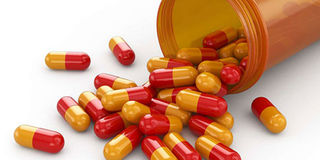Big pharma’s healthy contribution

Medicine. It will be in Kenya’s best interest to exploit the opportunities offered through the private public partnership umbrella and build on the relations with the ever-growing pharmaceutical sector. PHOTO | FILE | NATION MEDIA GROUP
What you need to know:
- Merck, Pfizer, GSK and Johnson & Johnson have donated significant amounts of drugs for the Neglected Tropical Disease control programme.
- Reckitt Benckiser, through the Dettol initiative, works in communities across the globe and with partners to deliver hygiene education.
With a macroeconomic growth of between five and 10 percent, according to the 2016-2017 Comesa biennial report, Kenya was recognised as one of the fastest growing countries in the world.
It has become a business hub in East Africa, with diverse investments by foreign firms keen to penetrate the lucrative regional markets. The pharmaceutical industry is no exception.
Statistics show that Kenya is the largest pharmaceutical market in the EAC, worth $740 million (S75bn) in 2014.
The entry of the world’s Top 10 pharmaceutical companies (with a combined revenue of about $330 billion in 2017) through representations, local affiliates and distributors, buttresses the country’s attractiveness for investment.
BENEFITS
However, there has been a long-running debate on the merits and demerits of the multinationals and their impact on the host country.
In Kenya, they offer benefits such as foreign direct investment and tax revenue.
The direct flow of capital improves the balance of payments, which results in export promotion and import substitution as more Kenyans benefit from high quality innovator products, including specialised biological products, vaccines and orphan drugs.
The firms, through their local affiliates, also invest heavily in building capacity and creating jobs, with a plethora of skills transferred to the host country.
Other benefits include increased competitiveness in the industry, resulting in better prices. Technology transfer also means that Kenya benefits from the many years of research and development already done by the multinationals.
HAZARD
On the other hand, critics decry the unmonitored influence the companies have on the country.
But from a pharmaceutical industry’s perspective, the influence has been positive by supporting the development of international pharmaceutical standards/guidelines and policies.
Other concerns include uncertainties with evolving business strategies, transfer pricing and export of profits.
There have also been concerns on environmental, health, safety and substandard activities in the host country.
However, this is mitigated by the fact that the pharmaceutical industry is highly regulated.
There are strict regulations by the Pharmacy and Poisons Board and the international standards, which the pharmaceutical companies abide with, as well the Ethical Code of Practice from Kenya Association of Pharmaceutical Industry (Kapi), which brings together firms and their local affiliates.
Kapi’s mission is to promote an ethical, innovative and responsible healthcare industry.
OUTREACH
We cannot discuss merits without acknowledging the corporate social responsibility being carried out for the betterment of Kenyans.
Merck, Pfizer, GSK and Johnson & Johnson have donated significant amounts of drugs for the Neglected Tropical Disease control programme.
Pfizer embarked on the Mobilise Against Malaria programme to address the gap in malaria treatment in Kenya, Ghana and Malawi.
Sanofi created a foundation, which focuses on three major objectives: Controlling childhood cancer, fighting maternal and child mortality, and ensuring access to healthcare for the world's poorest populations.
In May 2013, GSK and Save the Children Fund embarked on a partnership to save one million children's lives.
The focus was increasing vaccination, researching on new low-cost products to combat malnutrition, and boosting investment in the training of health workers.
TRAINING
The Novartis Access Programme offers a portfolio of 15 on and off patent medicines addressing key non-communicable diseases, cardiovascular diseases, Type 2 diabetes, respiratory illnesses and breast cancer.
Under the deal, Kenya pays of one US dollar per treatment per month.
Reckitt Benckiser, through the Dettol initiative, works in communities across the globe and with partners to deliver hygiene education.
Recently, Takeda announced the implementation of Seed Global Health programme worth 500 million Japanese yen for training health professionals in sub-Saharan Africa.
Unicef, through Gavi, the Vaccine Alliance, has partnered with some of these multinational pharmaceutical firms to provide access of life-saving vaccinations for children in the low-income countries.
With universal health coverage being one of the four pillars being pursued by the government, it will be in Kenya’s best interest to exploit the opportunities offered through the private public partnership umbrella and build on the relations with the ever-growing pharmaceutical sector.
Dr Mwangi is the KAPI Executive Secretary and PR lead [email protected]




